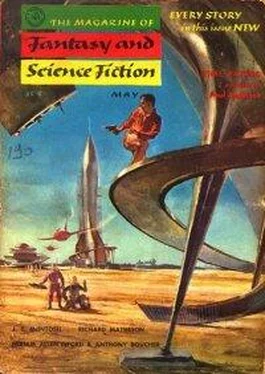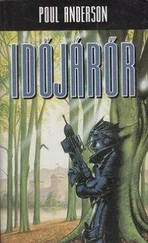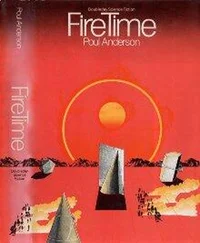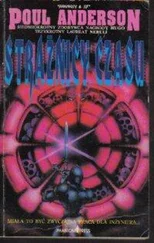Poul Anderson - Time Patrol
Здесь есть возможность читать онлайн «Poul Anderson - Time Patrol» весь текст электронной книги совершенно бесплатно (целиком полную версию без сокращений). В некоторых случаях можно слушать аудио, скачать через торрент в формате fb2 и присутствует краткое содержание. Год выпуска: 1955, Издательство: Fantasy House, Inc., Жанр: Альтернативная история, на английском языке. Описание произведения, (предисловие) а так же отзывы посетителей доступны на портале библиотеки ЛибКат.
- Название:Time Patrol
- Автор:
- Издательство:Fantasy House, Inc.
- Жанр:
- Год:1955
- ISBN:нет данных
- Рейтинг книги:4 / 5. Голосов: 1
-
Избранное:Добавить в избранное
- Отзывы:
-
Ваша оценка:
- 80
- 1
- 2
- 3
- 4
- 5
Time Patrol: краткое содержание, описание и аннотация
Предлагаем к чтению аннотацию, описание, краткое содержание или предисловие (зависит от того, что написал сам автор книги «Time Patrol»). Если вы не нашли необходимую информацию о книге — напишите в комментариях, мы постараемся отыскать её.
Time Patrol — читать онлайн бесплатно полную книгу (весь текст) целиком
Ниже представлен текст книги, разбитый по страницам. Система сохранения места последней прочитанной страницы, позволяет с удобством читать онлайн бесплатно книгу «Time Patrol», без необходимости каждый раз заново искать на чём Вы остановились. Поставьте закладку, и сможете в любой момент перейти на страницу, на которой закончили чтение.
Интервал:
Закладка:
“Cultivated fields,” observed Whitcomb. His voice was hushed in the stillness. “The Jutes and Saxons were mostly yeomen, you know, who came here looking for land. Imagine the Britons were pretty well cleared out of this area some years ago.”
“We’ve got to find out about that burial,” said Everard. “Shall we go back and locate the moment the grave was made? No, it might be safer to inquire now, at a later date when whatever excitement there was has died down. Say tomorrow morning.”
Whitcomb nodded, and Everard brought the hopper down into the concealment of a thicket and jumped up five hours. The sun was blinding in the northeast, dew glistened on the long grass, and the birds were making an unholy racket. Dismounting, the agents sent the hopper shooting up at fantastic velocity, to hover ten miles above-ground and come to them when called on a midget radio built into their helmets.
They approached the thorp openly, whacking off the savage-looking dogs which came snarling at them with the flat of sword and ax. Entering the courtyard, they found it unpaved but richly carpeted with mud and manure. A couple of naked, tow-headed children gaped at them from a hut of earth and wattles. A girl who was sitting outside milking a scrubby little cow let out a small shriek; a thick-built, low-browed farmhand swilling the pigs grabbed for a spear. Wrinkling his nose, Everard wished that some of the “Noble Nordic” enthusiasts of his century could visit this one.
A gray-bearded man with an ax in his hand appeared in the hall entrance. Like everyone else of this period, he was several inches shorter than the twentieth-century average. He studied them warily before wishing them good morning.
Everard smiled politely. “I hight Uffa Hundingsson, and my brother is Knubbi,” he said. “We are merchants from Jutland, come hither to trade at Canterbury.” (He gave it the present name, Cant-wara-byrig.) “Wandering from the place where our ship is beached, we lost our way, and after fumbling about all night found your home.”
“I hight Wulfnoth, son of Aelfred,” said the yeo-man. “Enter and break your fast with us.”
The hall was big and dim and smoky, full of a chattering crowd: Wulfnoth’s children, their spouses and children, dependent carls and their wives and children and grandchildren. Breakfast consisted of great wooden trenchers of half-cooked pork, washed down by horns of thin sour beer. It was not hard to get a conversation going; these people were as gossipy as isolated yokels anywhere. The trouble was with inventing plausible accounts of what was going on in Jutland. Once or twice Wulfnoth, who was no fool, caught them in some mistake, but Everard said firmly: “You have heard a falsehood. News takes strange forms when it crosses the sea.” He was surprised to learn how much contact there still was with the old countries. But the talk of weather and crops was not very different from the kind he knew in the twentieth century Middle West.
Only later was he able to slip in a question about the barrow. Wulfnoth frowned, and his plump, toothless wife hastily made a protective sign toward a rude wooden idol. “It is not good to speak of such things,” muttered the Jute. “I would the wizard had not been buried on my land. But he was close to my father, who died last year and would hear of naught else.”
“Wizard?” Whitcomb pricked up his ears. “What tale is this?”
“Well, you may as well know,” grumbled Wulf-noth. “He was a stranger hight Stane, who appeared in Canterbury some six years ago. He must have been from far away, for he spoke not the English or British tongues, but King Hengist guested him and eftsoons he learned. He gave the king strange but goodly gifts, and was a crafty redesman, on whom the king came more and more to lean. None dared cross him, for he had a wand which threw thunderbolts and had been seen to cleave rocks and once, in battle with the Britons, burn men down. There are those who thought he was Woden, but that cannot be since he died.”
“Ah, so.” Everard felt a tingle of eagerness. “And what did he whilst yet he lived?”
“Oh… he gave the king wise redes, as I have said. It was his thought that we of Kent should cease thrusting back the Britons and calling in ever more of our kinsmen from the old country; rather, we should make peace with the natives. He thought that with our strength and their Roman learning, we could together shape a mighty realm. He may have been right, though I for one see little use in all these books and baths, to say naught of that weird cross-god they have… Well, anyhow, he was slain by unknowns three years ago, and buried here with sacrifices and such of his possessions as his foes had not reaved. We give him an offering twice a year, and I must say his ghost has not made trouble for us. But still am I somewhat uneasy about it.”
“Three years, eh?” breathed Whitcomb. “I see…”
It took a good hour to break away, and Wulfnoth insisted on sending a boy along to guide them to the river. Everard, who didn’t feel like walking that far, grinned and called down the hopper. As he and Whitcomb mounted it, he said gravely to the bulging-eyed lad: “Know that thou hast guested Woden and Thunor, who will hereafter guard thy folk from harm.” Then he jumped three years back in time.
“Now comes the rough part,” he said, peering out of the thicket at the nighted thorp. The mound was not there now, the wizard Stane was still alive. “It’s easy enough to put on a magic show for a kid, but we’ve got to extract this character from the middle of a big, tough town where he’s the king’s right-hand man. And he has a blast-ray.”
“Apparently we succeeded—or will succeed,” said Whitcomb.
“Nope. It’s not irrevocable, you know. If we fail, Wulfnoth will be telling us a different story three years from now, probably that Stane is there—he may kill us twice! And England, pulled out of the Dark Ages into a neoclassical culture, won’t evolve into anything you’d recognize by 1894… I wonder what Stane’s game is.”
He lifted the hopper and sent it through the sky toward Canterbury. A night wind whistled darkly past his face. Presently the town loomed near, and he grounded in a copse. The moon was white on the half-ruined Roman walls of ancient Durovernum, dappled black on the newer earth and wood of the Jutish repairs. Nobody would get in after sunset.
Again the hopper brought them to daytime—near noon—and was sent skyward. His breakfast, two hours ago and three years in the future, felt soggy as Everard led the way onto a crumbling Roman road and toward the city. There was a goodly traffic, mostly farmers driving creaky ox-carts of produce in to market. A pair of vicious-looking guards halted them at the gate and demanded their business. This time they were the agents of a trader on Thanet who had sent them to interview various artisans here. The hoodlums looked surly till Whitcomb slipped them a couple of Roman coins; then the spears went down and they were waved past.
The city brawled and bustled around them, though again it was the ripe smell which impressed Everard most. Among the jostling Jutes, he spotted an occasional Romano-Briton, disdainfully picking a way through the muck and pulling his shabby tunic clear of contact with these savages. It would have been funny if it weren’t pathetic.
There was an extraordinarily dirty inn filling the moss-grown ruins of what had been a rich man’s town house. Everard and Whitcomb found that their money was of high value here where trade was principally in kind. By standing a few rounds of drinks, they got all the information they wanted. King Hengist’s hall was near the middle of town… not really a hall, an old building which had been deplorably prettied up under the direction of that outlander Stane… not that our good and doughty king is any pantywaist, don’t get me wrong, stranger… why, only last month… oh, yes, Stane! He lived in the house right next to it. Strange fellow, some said he was a god… he certainly had an eye for the girls… Yes, they said he was behind all this peace-talk with the Britons. More and more of those slickers coming in every day, it’s getting so an honest man can’t let a little blood without… Of course, Stane is very wise, I wouldn’t say anything against him, understand, after all, he can throw lightning…
Читать дальшеИнтервал:
Закладка:
Похожие книги на «Time Patrol»
Представляем Вашему вниманию похожие книги на «Time Patrol» списком для выбора. Мы отобрали схожую по названию и смыслу литературу в надежде предоставить читателям больше вариантов отыскать новые, интересные, ещё непрочитанные произведения.
Обсуждение, отзывы о книге «Time Patrol» и просто собственные мнения читателей. Оставьте ваши комментарии, напишите, что Вы думаете о произведении, его смысле или главных героях. Укажите что конкретно понравилось, а что нет, и почему Вы так считаете.












